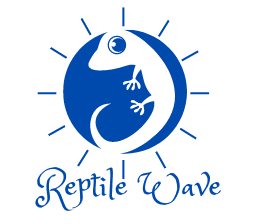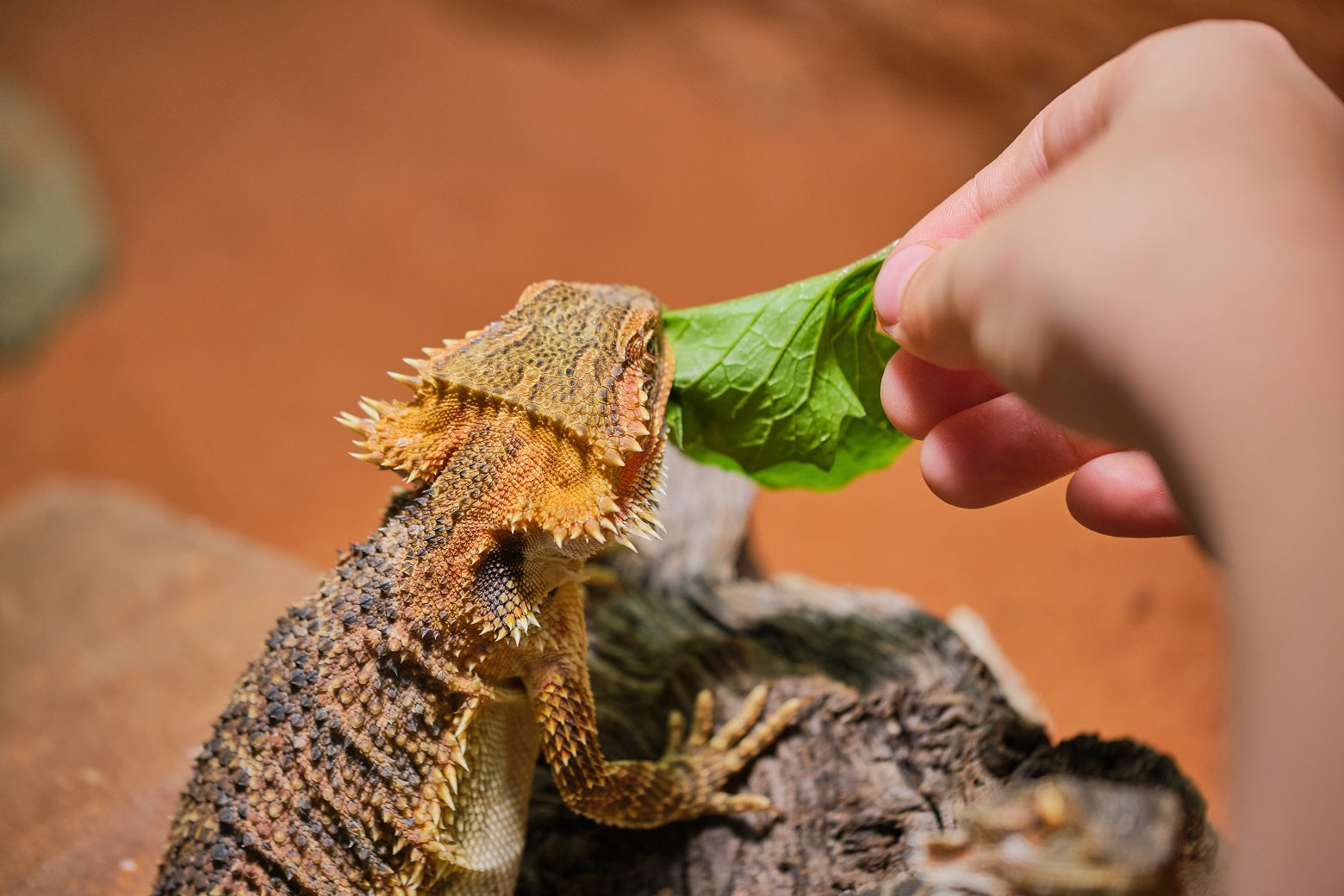Sure! Bearded dragons can eat broccoli rabe, also known as rapini, but just a little bit. Rapini is like a leafy green veggie. And it’s good for them because it has important stuff like vitamins A and C, calcium, and fiber.
When you give rapini to your bearded dragon, make sure to clean it really well to get rid of any yucky stuff on it. Cut it into small pieces so your dragon can eat it easily without getting choked.
Also, it’s a good idea to give your dragon different kinds of veggies, not just the same one all the time. That way, they stay healthy and happy!
What Is Rapini?
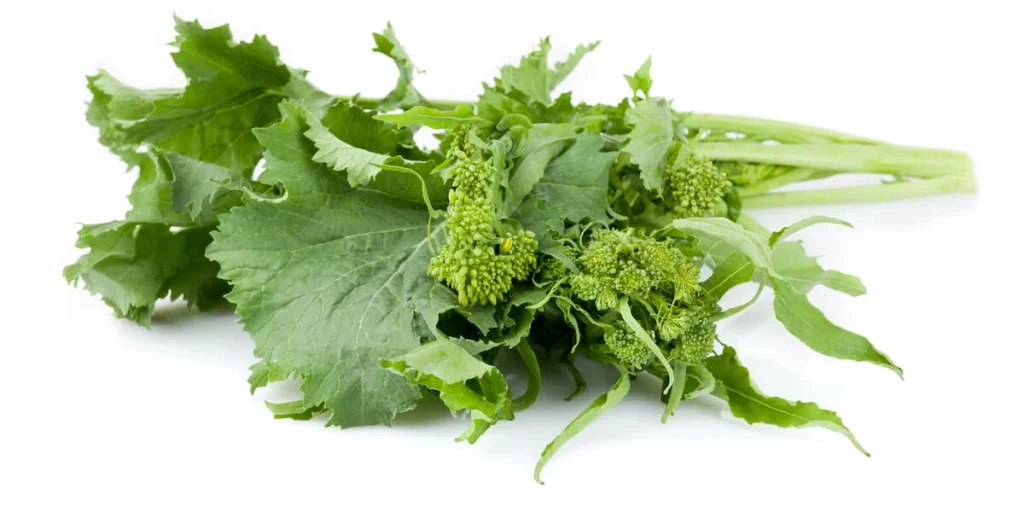
Rapini, scientifically known as Brassica rapa, belongs to the cruciferous vegetable family, sharing botanical ties with broccoli. Commonly referred to as broccoli rabe, this leafy green is a distinctive addition to the Brassicaceae family.
It features tender stems, dark green, slightly serrated leaves, and small florets. Moreover, it resembles broccoli but on a more delicate scale.
Despite its nomenclature, “broccoli rabe,” it’s important to note that rapini isn’t a variety of broccoli. Instead, it’s a unique vegetable that shares some visual characteristics with broccoli, particularly in its small, broccoli-like florets.
Nutrient Information for Rapini
| Nutrient | Amount | Unit | Recommended Range |
| Water | 92.6 | g | 91.1 – 94.1 |
| Energy | 22 | kcal | – |
| Protein | 3.17 | g | 2.1 – 4.51 |
| Total lipid (fat) | 0.49 | g | 0.33 – 0.59 |
| Carbohydrate, by difference | 2.85 | g | – |
| Fiber, total dietary | 2.7 | g | 2.4 – 3.2 |
| Total Sugars | 0.38 | g | – |
| Calcium, Ca | 108 | mg | 86 – 130 |
For more details, you can check the USDA FoodData Central.
Can Bearded Dragons Eat Rapini? What Nutrients Does Rapini Offer?
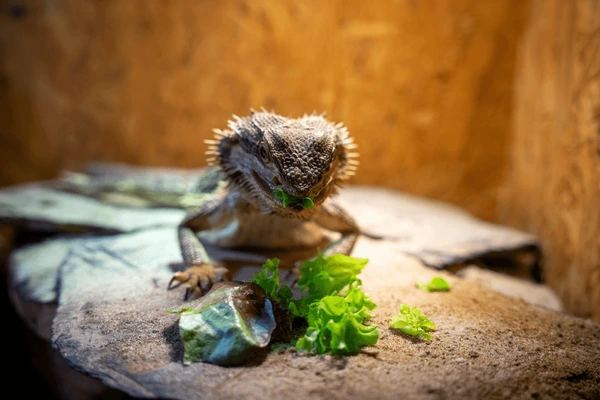
Bearded dragons need a diet where there’s about twice as much calcium as phosphorus, around a 2:1 ratio. This helps their bones grow right and keeps them healthy overall.
Rapini benefits your bearded dragons by providing important nutrients like vitamins A and C, calcium, and fiber. This leafy green is a nutritious addition to their diet, supporting their overall health and happiness.
Vitamins A and C
Rapini is like a superhero for bearded dragons because it gives them two special vitamins – Vitamin A and Vitamin C.
Vitamin A Benefits
This vitamin helps keep their skin healthy, makes sure they can see well, and makes their immune system strong. It’s like a shield against infections, keeping dragons lively and tough.
Vitamin C Contributions
Rapini also has Vitamin C, which is like a superhero sidekick. It helps their immune system and helps their body use other important nutrients.
Calcium
Imagine calcium as the builder for strong dragon bones. Rapini has this important stuff, especially crucial when little dragons are growing or for those having dragon babies.
Calcium in rapini acts like armor, protecting dragons from a disease that makes their bones weak and bendy. It’s like giving them super-strong bones!
Fiber
Fiber in rapini is like a cleaner for a dragon’s tummy. It helps them have regular, healthy poops and stops them from getting constipated.
Including rapini in their meals makes sure dragons get a mix of good things to eat. It keeps their tummy happy and helps them stay healthy all around.
How To Safely Prepare Rapini For Bearded Dragons?
Make sure your bearded dragons stay healthy by knowing the right ways to safely prepare rapini for them.
Clean It Up
- Wash the rapini leaves really well to remove any yucky stuff like pesticides or chemicals.
- Choose organic rapini if you can – it’s safer for your dragon.
- Use running water to clean each leaf, especially in the folds and corners where bad stuff might hide.
- Look at each leaf closely, and if it looks weird or has bugs on it, cut that part off.
Cut it Right
- Chop the rapini into small pieces so your dragon won’t choke.
- Make sure the pieces are all about the same size, so it’s easy for your dragon to eat.
- If your dragon is small, cut the pieces smaller; if it’s big, you can cut them a bit bigger.
Make it Easy to Eat
- Some dragons like their rapini a bit softer. You can make it softer by steaming or blanching it a little.
- Softening the rapini makes it easier for your dragon to digest.
Keep an Eye Out
- Watch your dragon after you feed it rapini.
- If it acts strange or doesn’t eat well, maybe try changing how you prepare the rapini.
- Give your dragon a mix of different foods to keep it healthy and happy.
Remember, keeping the rapini clean and in small pieces is important for your dragon’s safety. If your dragon likes softer rapini, you can try that too.
Always keep an eye on your dragon to make sure it’s happy and healthy after eating.
What Risks Are Associated With Feeding Bearded Dragons Rapini?
While rapini (broccoli rabe) can be a good food for bearded dragons. There are some things to be careful about to keep them healthy:
Calcium-to-Phosphorus Ratio
Rapini has phosphorus, and while it also has calcium, the balance may not be perfect for bearded dragons.
The right balance is crucial for strong bones. Too much rapini without enough calcium may cause bone problems.
Oxalates
Rapini, like many leafy greens, has oxalates. Too many oxalates can mix with calcium, forming crystals or stones that might affect calcium absorption or lead to urinary issues. Eating a variety of foods helps lower the risk.
Pesticide Contamination
If rapini isn’t washed well, it might have pesticides, which can be harmful to bearded dragons. Always wash rapini thoroughly before feeding to reduce the risk of pesticide exposure.
Gastrointestinal Upset
Trying new foods, like rapini, can sometimes upset a bearded dragon’s stomach.
Watch for changes in their poop, if they become lazy, or if they don’t want to eat. Start slowly to avoid problems.
Allergic Reactions
Some bearded dragons might be allergic to certain foods like rapini. Look for signs like swelling, difficulty breathing, or changes in behavior. If you see any issues, talk to a vet.
How Often Should I Feed My Bearded Dragon Rapini?
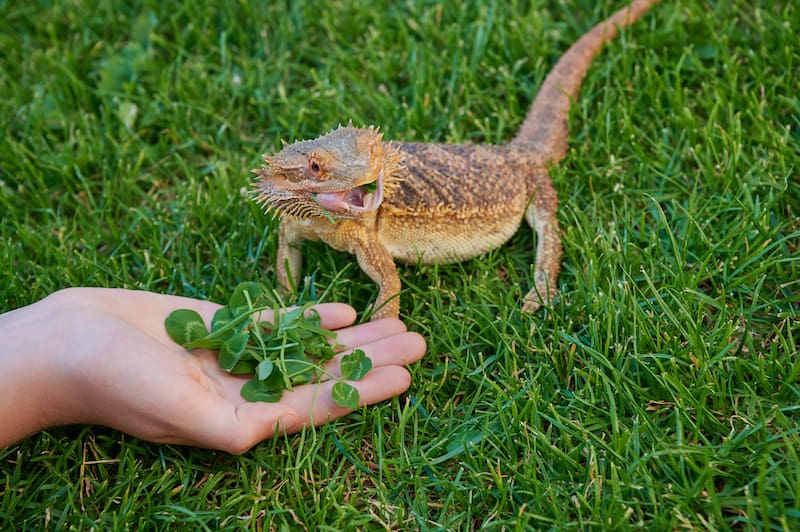
As a usual guideline, it’s advised that rapini should make up only about 10% of your bearded dragon’s diet. So, to keep your bearded dragon healthy, it’s good to give them rapini 2-3 times a week.
This way, they get the good stuff from the rapini without eating it too much. Mix it up by adding different veggies, fruits, and insects to their meals, so they get a bit of everything.
Furthermore, make sure they eat a mix of things and go to the vet regularly. It helps keep your bearded dragon happy and healthy in the long run.
FAQ’s
Let’s tackle common queries on the Bearded Dragon Eating Habit.
Beardies should avoid certain greens with high oxalate levels, such as spinach and Swiss chard. These can interfere with calcium absorption.
Yes, bearded dragons can eat escarole in moderation.
Avoid feeding bearded dragons foods high in oxalates, like spinach, and those with high phosphorus, such as rhubarb. Insects caught in the wild, toxic plants, and processed human foods should also be avoided.
Bearded dragons have individual preferences, but commonly enjoyed vegetables include collard greens, mustard greens, and squash.
Vegetables like onions, garlic, and leeks are toxic to bearded dragons .
Final Thoughts
In conclusion, bearded dragons can eat rapini, a leafy green veggie that’s good for them. Just give a little bit and make sure to offer different foods like veggies, fruits, and bugs to keep them healthy.
Before giving rapini, wash it, cut it into small pieces, and see how your dragon likes it. If it’s their first time, start slowly. Always check with a vet to make sure your bearded dragon is eating the right things for a happy and healthy pet.
